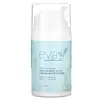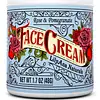What's inside
What's inside
 Key Ingredients
Key Ingredients

 Benefits
Benefits

 Concerns
Concerns

 Ingredients Side-by-side
Ingredients Side-by-side

Water
Skin ConditioningCetearyl Alcohol
EmollientSorbitan Fatty Acid Ester
EmulsifyingCocos Nucifera Oil
MaskingGlycine Soja Oil
EmollientStearic Acid
CleansingIsopropyl Myristate
EmollientHyaluronic Acid
HumectantDimethylaminoethanol Tartrate
EmollientRetinol
Skin ConditioningLentinus Edodes Extract
Skin ConditioningRosa Canina Fruit Extract
AstringentAspalathus Linearis Extract
Skin ConditioningCamellia Sinensis Leaf Extract
AntimicrobialDMDM Hydantoin
PreservativePotassium Sorbate
PreservativeParfum
MaskingTetrasodium EDTA
Pantothenic Acid
Skin ConditioningPyridoxine
Skin ConditioningUbiquinone
AntioxidantThioctic Acid
AntioxidantThiamine Hcl
MaskingRiboflavin
Cosmetic ColorantCalcium Ascorbate
AntioxidantTocopherol
AntioxidantCyanocobalamin
Skin ConditioningWater, Cetearyl Alcohol, Sorbitan Fatty Acid Ester, Cocos Nucifera Oil, Glycine Soja Oil, Stearic Acid, Isopropyl Myristate, Hyaluronic Acid, Dimethylaminoethanol Tartrate, Retinol, Lentinus Edodes Extract, Rosa Canina Fruit Extract, Aspalathus Linearis Extract, Camellia Sinensis Leaf Extract, DMDM Hydantoin, Potassium Sorbate, Parfum, Tetrasodium EDTA, Pantothenic Acid, Pyridoxine, Ubiquinone, Thioctic Acid, Thiamine Hcl, Riboflavin, Calcium Ascorbate, Tocopherol, Cyanocobalamin
Petroleum Distillates
SolventAloe Barbadensis Leaf Juice
Skin ConditioningGlycerin
HumectantPersea Gratissima Oil
Skin ConditioningEmulsifying Wax Nf
Limnanthes Alba Seed Oil
Skin ConditioningPunica Granatum Fruit Extract
AntioxidantCitrus Aurantium Dulcis Fruit Extract
MaskingCitrus Limon Fruit Extract
MaskingVaccinium Macrocarpon Fruit Extract
AstringentTocopherol
AntioxidantCalcium Ascorbate
AntioxidantEthylhexylglycerin
Skin ConditioningPhenoxyethanol
PreservativeUbiquinone
AntioxidantRetinol
Skin ConditioningThioctic Acid
AntioxidantPanthenol
Skin ConditioningPantothenic Acid
Skin ConditioningNiacinamide
SmoothingCanola Oil
EmollientLecithin
EmollientCitric Acid
BufferingPetroleum Distillates, Aloe Barbadensis Leaf Juice, Glycerin, Persea Gratissima Oil, Emulsifying Wax Nf, Limnanthes Alba Seed Oil, Punica Granatum Fruit Extract, Citrus Aurantium Dulcis Fruit Extract, Citrus Limon Fruit Extract, Vaccinium Macrocarpon Fruit Extract, Tocopherol, Calcium Ascorbate, Ethylhexylglycerin, Phenoxyethanol, Ubiquinone, Retinol, Thioctic Acid, Panthenol, Pantothenic Acid, Niacinamide, Canola Oil, Lecithin, Citric Acid
 Reviews
Reviews

Ingredients Explained
These ingredients are found in both products.
Ingredients higher up in an ingredient list are typically present in a larger amount.
Calcium Ascorbate contains both Vitamin C and calcium.
It is an antioxidant and can help to reduce redness, improve skin texture, reduce the effects of aging, and reduce the visibility of dark spots.
Read more about other types of Vitamin C:
Learn more about Calcium AscorbatePantothenic Acid is an essential vitamin. Our bodies use it for metabolizing fatty acids, proteins, carbohydrates, and fats.
Retinol is a gold-standard ingredient for anti-aging. It is a form of Vitamin A and belongs to the class of retinoids that also includes tretinoin.
Why is retinol famous?
It has the most scientific studies backing up its skin benefits out of all the non-prescription ingredients.
Retinol is proven to:
This is why retinol is effective at removing wrinkles, fading dark spots, treating acne, and reducing the appearance of pores.
Studies show retinol is less effective when exposed to UV. Be sure to look for appropriate packaging to keep your retinol potent (similar to Vitamin C).
Using retinol or any retinoids will increase sun-sensitivity in the first few months. Though studies show retinoids increase your skin's natural SPF with continuous use, it is best to always wear sunscreen and sun-protection.
We recommend speaking with a medical professional about using this ingredient during pregnancy.
Retinol may cause irritation in some people, so be sure to patch test. Experts recommend 'ramping up' retinol use: start using this ingredient once a week and work up to using it daily.
Read about Tretinoin
Learn more about RetinolThioctic Acid is an enzyme and antioxidant. A more common name for this is Alpha Lipoic Acid.
Alpha Lipoic Acid can be naturally found in the mitochondria of every cell.
Antioxidants help fight free-radicals. Free-radicals are molecules that may damage your skin cells. The antioxidants in Alpha Lipoic Acid have been shown to fight damage from cigarette smoke.
Studies also show Alpha Lipoic Acid plays a role in wound healing.
Thioctic Acid will break down when exposed to sunlight.
Many foods contain thioctic acid, including tomato, brussel sprouts, spinach, and broccoli.
Learn more about Thioctic AcidTocopherol (also known as Vitamin E) is a common antioxidant used to help protect the skin from free-radicals and strengthen the skin barrier. It's also fat soluble - this means our skin is great at absorbing it.
Vitamin E also helps keep your natural skin lipids healthy. Your lipid skin barrier naturally consists of lipids, ceramides, and fatty acids. Vitamin E offers extra protection for your skin’s lipid barrier, keeping your skin healthy and nourished.
Another benefit is a bit of UV protection. Vitamin E helps reduce the damage caused by UVB rays. (It should not replace your sunscreen). Combining it with Vitamin C can decrease sunburned cells and hyperpigmentation after UV exposure.
You might have noticed Vitamin E + C often paired together. This is because it is great at stabilizing Vitamin C. Using the two together helps increase the effectiveness of both ingredients.
There are often claims that Vitamin E can reduce/prevent scarring, but these claims haven't been confirmed by scientific research.
Learn more about TocopherolUbiquinone (Coenzyme Q10) is a molecule already found in our bodies. It is a potent antioxidant and skin-soothing ingredient.
Aging and environmental exposure diminishes our skin's natural ubiquinone levels. This is much like our natural collagen and elastin.
The good news is: studies show applying this ingredient topically replenishes ubiquinone levels in our skin. This also comes with a ton of skin benefits. These benefits include:
Ubiquinone is considered a large molecule and cannot be absorbed into the lower layers of skin. This is why it is believed to be such an effective antioxidant: it protects our skin in the upper layers and prevents damage in the deeper layers.
When used in sunscreen, ubiquinone is shown to increase ingredient stability, increase SPF factor, and add to infrared protection.
Fun fact: ubiquinone is fat-soluble.
Learn more about Ubiquinone